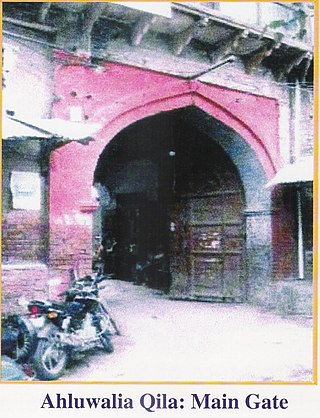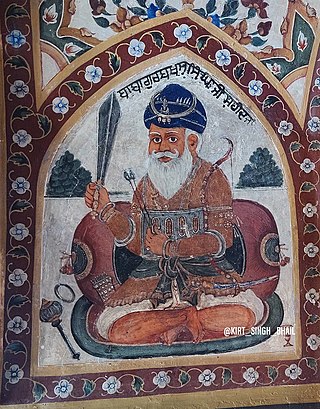
The Sukerchakia Misl was one of twelve Sikh misls in Punjab during the 18th century, concentrated in Gujranwala and Hafizabad districts in western Punjab and ruled from (1752–1801). The misl was founded by Charat Singh of Sandhawalia, grandfather of Maharaja Ranjit Singh. The last Sukerchakia Misldar was Maharaja Ranjit Singh. Towards the end of the eighteenth century, Maharaja Ranjit Singh united all the misls and established an independent Sikh Empire.

Maha Singh, also spelt as Mahan or Mahn Singh, was the second chief of the Sukerchakia Misl. He was the eldest son of Sardar Charat Singh and Sardarni Desan Kaur Warraich. He was the father of Sher-e-Punjab Maharaja Ranjit Singh.

Maharani Datar Kaur (born Bibi Raj Kaur Nakai; was the queen consort of Maharaja Ranjit Singh, the founder of the Sikh Empire and the mother of his successor, Maharaja Kharak Singh. She was the daughter of Sardar Ran Singh Nakai, third ruler of the Nakai Misl and Sardarni Karmo Kaur.

The Nakai Misl, founded by Sandhu Jats, was one of the twelve Sikh Misls that later became the Sikh Empire. It held territory between the Ravi and Sutlej rivers southwest of Lahore in what became Pakistan. The misl fought against the Sials, the Pathans and the Kharals before it was incorporated into the Sikh Empire of the Sukerchakia Misl by Ranjit Singh.

The Bhangi Misl was a large and powerful Sikh Misl headquartered in Amritsar. It was founded in the early 18th century by Sardar Chhajja Singh Dhillon, who was baptised by Banda Singh Bahadur. The misl received its name "Bhangi" because Chhajja Singh and his soldiers frequently used the herbal intoxicant bhang. It was a first misl to established a Khalsa Raj and publish Khalsa currency coins. The Bhangi Kingdom/Misl was founded by Dhillon Jats.

Sardar Charat Singh, also romanised as Charhat Singh, was the founder of Sukerchakia Misl and father of Mahan Singh, and the grandfather of Ranjit Singh. He distinguished himself at an early age in campaigns against Ahmad Shah Abdali and along with 150 horsemen split from the Singhpuria Misl to establish the Sukerchakia Misl.

Rani Sada Kaur was a Sikh leader. She served as the Chief of the Kanhaiya Misl from 1789 to 1821, following the death of her husband Gurbaksh Singh Kanhaiya, the heir to Jai Singh Kanhaiya, the leader of the Kanhaiya Misl, and she is sometimes referred to as Sardarni Sada Kaur.

Jodh Singh Ramgarhia was a prominent Sikh leader of the Ramgarhia Misl in the Punjab, the son of Jassa Singh Ramgarhia who inherited Jassa's position on his death in 1803. His Ramgarhia followers played an important role in the struggle when Maharaja Ranjit Singh was establishing the Sikh Empire.
Manawala is a city in Sheikhupura District, Punjab, Pakistan. It is situated on the Lahore-Sheikhupura-Faisalabad road.
The Battle of Gujranwala was fought between the Durrani Empire and the Sikh Confederacy in September 1761.

Ramgarhia Misl was a sovereign state (misl) in the Sikh Confederacy of Punjab region in present-day India and Pakistan. The misl's name is derived from Qila Ramgarh, a place located in Ramsar, near Amritsar, which was fortified and redesigned by Ramgarhia Misl chief Jassa Singh Ramgarhia. The Ramgarhia Misl was one of the twelve major Sikh misls, and held land near Amritsar.

Ahluwalia was a misl, that is, a sovereign state in the Sikh Confederacy of Punjab region in present-day India and Pakistan. The misl's name is derived from Ahlu, the ancestral village of the misl leaders. The Ahluwalia misl was one of the 12 major Sikh misls, and held land to the north of Sutlej river.
Sardarni Desan Kaur Waraich, also known as Mai Desan was the regent of the Sukerchakia Misl during the minority of her son from 1770. She was the wife of Sardar Charat Singh and the mother of Sardar Maha Singh. Her grandson, Maharaja Ranjit Singh, was the founder of the Sikh Empire.
Sardar Kahan Singh Nakai was the sixth and the last chief of the Nakai Misl. He was the grandson of the famous Sikh chief, Ran Singh Nakai and Sardarni Karmo Kaur. His aunt, Maharani Datar Kaur was the wife of Maharaja Ranjit Singh, founder of the Sikh Empire; thus making him the nephew of the Sher-e-Punjab. From an early age he assisted his father in campaigns and even commanded campaigns assigned to him by his uncle, Maharaja Ranjit Singh. His cousin, Kharak Singh went to become the second Maharaja of the Sikh Empire. He was the uncle of the third Maharaja, Nau Nihal Singh.
Sardarni Karam Kaur popularly known as Karmo Kaur was the wife of Ran Singh Nakai,the third ruler of the Nakai Misl. She served as the regent of the Nakai Misl during the reign of her sons, Bhagwan Singh and Gyan Singh. Being the mother of Maharani Datar Kaur, she was the mother-in-law of Maharaja Ranjit Singh, the founder of the Sikh Empire. She was the grandmother of Maharaja Kharak Singh, the second king of the Sikh Empire and Sardar Kahan Singh Nakai, the last chief of the Nakai Misl.
Mian Ghaus Khan, also known as Mian Ghausa, was a Punjabi Muslim of Arain descent who served as an artillery officer of the Sukerchakia Misl under Sardar Maha Singh. After Maha Singh's death, Ghaus Khan served his son, Ranjit Singh, the founder of the Sikh Empire. Ghaus Khan's son, Sultan Mahmud Khan and grandson, Sultan Ahmad Ali Khan, too served in the Sikh Khalsa Army.

Baba Gurbaksh Singh was a Sikh warrior from the 18th century who served under the Shaheedan Misl of the Sikh confederacy. Gurbaksh Singh along with 29 other Sikh warriors led a last stand against the Afghan and Baloch forces on December 1, 1764, at Amritsar. It was in this skirmish that Baba Gurbaksh Singh along with 29 other Sikhs were killed.
Mughalchak is a town in Gujranwala District, Punjab, Pakistan.








